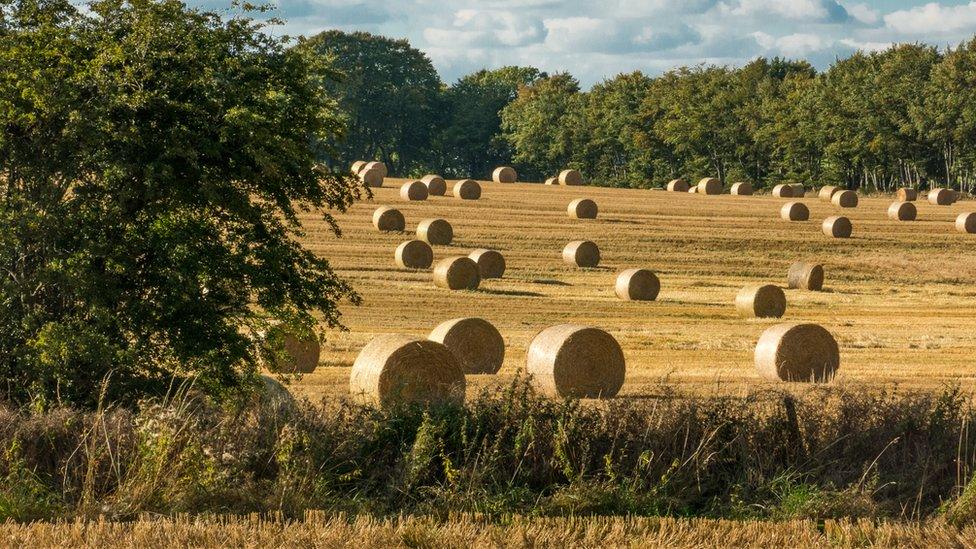Scots NFU backs post-Brexit farm deal
- Published

Scottish farmers' leaders gave the new approach a cautious welcome
The body representing Scottish farmers has given a cautious welcome to plans for a new deal on support after Brexit.
UK Environment Secretary Michael Gove indicated farmers will be paid for delivering benefits for nature and the countryside instead of receiving subsidies for the land they farm.
NFU Scotland said Mr Gove's suggestion "chimes with our thoughts".
But the SNP has claimed the change in approach represents "an unambiguous threat" to Scottish farmers' incomes.
NFU Scotland Director of Policy Jonnie Hall said: "While the headlines will be on 'Green Brexit', there was a significant amount of agricultural content in the Secretary of State's speech.
"The clear statement regarding a move away from the current area-based support system fully justifies our approach to have an open and frank discussion with our membership now and every member of NFUS has received a copy of our Change document in the past few days.
"The Secretary of State's statement that support 'must be earned' chimes with our thoughts."
Mr Gove said there must be clear benefits from public money given to farmers
Under the EU Common Agricultural Policy, famers in the UK receive about £3bn annually, mostly linked to the amount of land they farm.
The UK government has said it will maintain funding levels until 2022, but Mr Gove said ministers could only go on "generously supporting farmers" in the face of other demands on spending if the environmental benefits were clear.
Outlining his belief that there needs to be a change of approach, Mr Gove said: "The Common Agricultural Policy rewards size of land-holding ahead of good environmental practice, all too often puts resources in the hands of the already wealthy rather than into the common good of our shared natural environment, and encourages patterns of land use which are wasteful of natural resources."
Responding to Mr Gove's comments, Mr Hall said: "In the future, there is a justifiable case for Scottish agriculture to receive the same levels of funding as it currently receives, ring-fenced and spent in new and more effective ways to improve productivity, efficiency and resilience.
"That is a central plank of the discussions we will be having with politicians and their officials in the weeks and months ahead.
"While accepting of change, we will also be considering the case for a transitional shift from land to activity-based incentives. We would want to reward risk and recognise good stewardship, not inertia."
Natural resources
Scottish Land and Estates, which represents many of Scotland's landowners, also welcomed Mr Gove's comments but was cautious about the pace of change.
"Before we change the current rules too radically, there is a challenge for Scottish agriculture to improve its profitability and therefore resilience, which has to be our top priority in the next five to ten years," said David Johnstone, the chairman of the landowners' body.
"We were pleased to see Mr Gove acknowledge that many regions of the UK will still need greater levels of support where farming is more difficult.
"In Scotland, 85% of our land is classified as 'poor' - the opposite of what exists in England. We also have a much greater forestry industry so it is important that the Scottish government plays a significant role in developing the detail on this policy that works for Scotland's unique needs."
'Unambiguous threat'
The SNP said it feared the new arrangements could leave farmers in Scotland worse off.
Stewart Stevenson, who is a member of the Scottish Parliament's rural economy committee, said: "This is an unambiguous Tory threat to continued agricultural support funding after 2022 - that is the stark post-Brexit reality which the UK Government is now proposing for our rural communities.
"Scottish farmers, like others across the UK, rely heavily on farming subsidies and their farm payments must be protected.
"Michael Gove's empty rhetoric and false promises during the Brexit campaign have long since been exposed, and now he is backtracking on all the assurances he has ever made to Scotland."
Mr Stevenson added: "Powers over agriculture and fisheries must be repatriated to Scotland to enable a localised approach to these sectors and to put them and the wider natural environment at the heart of what we do.
"And it is vital that UK funding follows the powers to enable delivery."
- Published21 July 2017